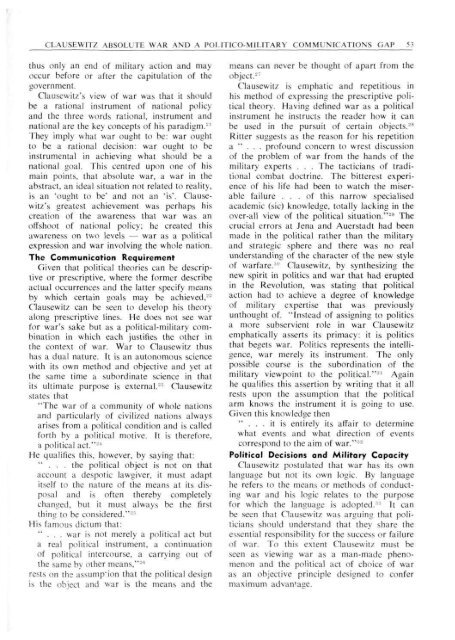ISSUE 3 : Mar/Apr - 1977 - Australian Defence Force Journal
ISSUE 3 : Mar/Apr - 1977 - Australian Defence Force Journal
ISSUE 3 : Mar/Apr - 1977 - Australian Defence Force Journal
You also want an ePaper? Increase the reach of your titles
YUMPU automatically turns print PDFs into web optimized ePapers that Google loves.
CLAUSEWITZ ABSOLUTE WAR AND A POLITICO-MILITARY COM Ml NICATIONS (JAP 53thus only an end of military action and mayoccur before or after the capitulation of thegovernment.Clausewitz's view of war was that it shouldbe a rational instrument of national policyand the three words rational, instrument andnational arc the key concepts of his paradigm.-'They imply what war ought to be: war oughtto be a rational decision: war ought to beinstrumental in achieving what should be anational goal. This centred upon one of hismain points, that absolute war, a war in theabstract, an ideal situation not related to reality,is an 'ought to be' and not an "is'. Clause -witz's greatest achievement was perhaps hiscreation of the awareness that war was anoffshoot of national policy; he created thisawareness on two levels — war as a politicalexpression and war involving the whole nation.The Communication RequirementGiven that political theories can be descriptiveor prescriptive, where the former describeactual occurrences and the latter specify meansby which certain goals may be achieved,--'Clausewitz can be seen to develop his theoryalong prescriptive lines. He does not see warfor war's sake but as a political-military combinationin which each justifies the other inthe context of war. War to Clausewitz thushas a dual nature. It is an autonomous sciencewith its own method and objective and yet atthe same time a subordinate science in thatits ultimate purpose is external.- 3 Clausewitzstates that"The war of a community of whole nationsand particularly of civilized nations alwaysarises from a political condition and is calledforth by a political motive. It is therefore,a political act."-'He qualifies this, however, by saying that:"... the political object is not on thataccount a despotic lawgiver, it must adaptitself to the nature of the means at its disposaland is often thereby completelychanged, but it must always be the firstthing to be considered." 25His famous dictum that:" . . . war is not merely a political act buta real political instrument, a continuationof political intercourse, a carrying out ofthe same by other means," 26rests on the assump'ion that the political designis the object and war is the means and themeans can never be thought of apart from theobject. 27Clausev.it/ is emphatic and repetitious inhis method of expressing the prescriptive politicaltheory. Having defined war as a politicalinstrument he instructs the reader how it canbe used in the pursuit of certain objects. 28Ritter suggests as the reason for his repetitiona " . . . profound concern to wrest discussionof the problem of war from the hands of themilitary experts . . . The tacticians of traditionalcombat doctrine. The bitterest experienceof his life had been to watch the miserablefailure ... of this narrow specialisedacademic (sic) knowledge, totally lacking in theover-all view of the political situation." 29 Thecrucial errors at Jena and Auerstadt had beenmade in the political rather than the militaryand strategic sphere and there was no realunderstanding of the character of the new styleof warfare. 3 " Clausewitz, by synthesizing thenew spirit in politics and war that had eruptedin the Revolution, was stating that politicalaction had to achieve a degree of knowledgeof military expertise that was previouslyunthought of. "Instead of assigning to politicsa more subservient role in war Clausewitzemphatically asserts its primacy: it is politicsthat begets war. Politics represents the intelligence,war merely its instrument. The onlypossible course is the subordination of themilitary viewpoint to the political." 31 Againhe qualifies this assertion by writing that it allrests upon the assumption that the politicalarm knows the instrument it is going to use.Given this knowledge then... it is entirely its affair to determinewhat events and what direction of eventscorrespond to the aim of war." 3Political Decisions and Military CapacityClausewitz postulated that war has its ownlanguage but not its own logic. By languagehe refers to the means or methods of conductingwar and his logic relates to the purposefor which the language is adopted. 33 It canbe seen that Clausewitz was arguing that politiciansshould understand that they share theessential responsibility for the success or failureof war. To this extent Clausewit/ must beseen as viewing war as a man-made phenomenonand the political act of choice of waras an objective principle designed to confermaximum advan'age.
















